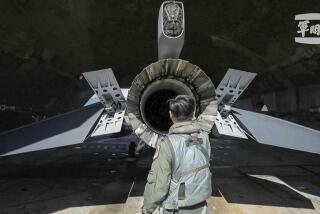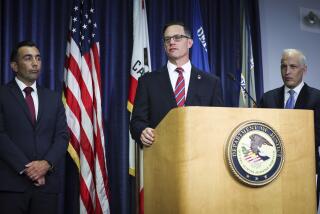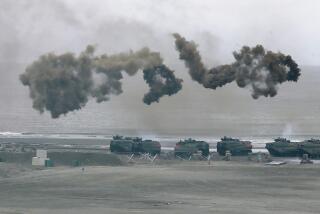Taiwan to Lobby Against U.S. Naval Aid to China
TAIPEI, Taiwan — Chinese Nationalist authorities served notice Tuesday that they are worried about the possibility the United States will agree to sell naval equipment to Peking and said Taiwan’s supporters will try to block any such deal in the U.S. Congress.
Raymond S.H. Hoo, chairman of Taiwan’s Coordination Council for North American Affairs, said in an interview that recent reports that the United States will help modernize the Chinese navy are “very serious.” If this modernization is carried out, he said, “the military balance we have now (between China and Taiwan) will be disrupted.”
Hoo noted that under American law, any major weapons sales negotiated by the executive branch must be approved by Congress. Asked whether a sale of naval equipment to China could be stopped in Congress, he replied, “Yes, I think so.”
“I can say frankly, we have many friends in the Congress, both in the Democratic and Republican parties,” said Hoo, whose group has handled all dealings with the United States since 1979, when Washington broke diplomatic relations with Taiwan in order to normalize them with the Chinese Communists in Peking. These friends have the opinion that “selling any weapons to Communist countries should be examined very, very carefully,” he said.
At the American Institute in Taiwan, the organization that represents U.S. government interests here, spokesman Avid W. Hess refused to respond to Hoo’s remarks, saying, “We don’t comment on weapons matters.”
Earlier this month, on the eve of a visit to China by Gen. John W. Vessey Jr., chairman of the Joint Chiefs of Staff, newspaper reports from Washington said that the United States and China had agreed upon a plan for sales of sonar equipment, gas turbines and other new technology to the Chinese navy.
American officials have said no deal on naval equipment has been completed but acknowledged that such discussions are taking place.
The proposed modernization of the Chinese navy is apparently part of a broader arrangement on naval cooperation between Washington and Peking, which have both expressed concern about the buildup of Soviet naval forces in the Pacific.
Final details are now being worked out on an agreement in principle to allow U.S. Navy ships to make port calls in China for the first time since 1949.
On one occasion last fall, Chinese leader Deng Xiaoping told a group of Japanese visitors that his country does not have the military strength to invade Taiwan but that it does have the power to mount a naval blockade of the island. That brief remark attracted great attention in Taiwan.
More to Read
Sign up for Essential California
The most important California stories and recommendations in your inbox every morning.
You may occasionally receive promotional content from the Los Angeles Times.










